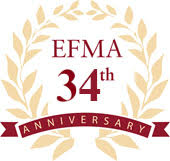menu
- e-LIBRARY
-
EFMA MEETINGS
- 2026 Annual Meetings
- 2025 Annual Meetings
- 2024 Annual Meetings
- 2023 Annual Meetings
- 2022 Annual Meetings
- 2021 Annual Meetings
- 2020 Annual Meetings
- 2019 Annual Meetings
- 2018 Annual Meetings
- 2017 Annual Meetings
- 2016 Annual Meetings
- Future Meetings
- Past Meetings
- EFMA Exhibitors
- EFMA 2017 Ballot
- EFMA Officers
- Membership
- EFM JOURNAL
-
EFM MEETINGS
- EFM Dubai 2023 Meeting
- EFM Dubai 2022 Meeting
- 2017 Finance and Real Economy
- 2012 Asset Management
- 2011 Alternative Investment
- 2011 Asian Financial Management
- 2010 Asian Finance
- 2010 Entrepreneurial Finance & Venture Capital Market
- 2009 Corporate governance and Control
- 2009 Risk Management in Financial Institutions
- 2008 Risk and Asset Management
- 2008 Initial Public Offerings (IPO's)
- 2007 Corporate Governance & Shareholder Activism
- 2006 Behavioral Finance
- 2005 Corporate Governance
- ANNOUNCEMENTS
- RESOURCES
- CONTACT US
- ADVERTISEMENTS
- GUEST POST


